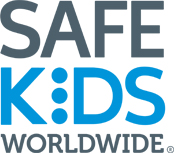Safe Kids Worldwide and Chevrolet team up for Take Time to Tether public awareness campaign [Infographic]
Washington, D.C. – New research shows that more than half of forward-facing car seats are not used properly because of one misunderstood but essential step in installation: attaching the top tether. In fact, in a 2016 study of those who came to car seat checkup events, 64 percent of forward-facing car seats with harnesses were not attached using the tether.
This is a serious concern because the tether is an important safety device to protect children in cars.
- The tether is the strap on the back of a forward-facing car seat that secures the top of the car seat to a dedicated anchor in the car. All vehicles made after 2001 are required to have at least 3 tether anchors.
- When attached and used correctly, the tether keeps a forward-facing car seat from pitching forward in a crash or sudden stop.
- Without this protection, a child’s head can move an additional 4-6 inches, which could cause serious harm if the child’s head hits the back of the front seat, other occupants or even the center console.
- Using the tether could mean the difference between a serious head injury and no injury at all.
“Our research shows many parents don’t know about the tether, and don’t realize that their child is not fully protected. We want to fix that.” said Lorrie Walker, Child Passenger Safety Expert for Safe Kids Worldwide. “Parents: Join us in encouraging every person who drives your child to take time to tether.”
The research also shows that lack of tether use is an historic problem. Over a ten-year span, tether use is consistently low and many families who use it don’t use it correctly.
But the good news is education works. In 2016, parents and caregivers were shown the importance of using the tether at a Safe Kids car seat checkup event. At a follow-up event six weeks later with the same families, correct tether use increased by 37 percent.
“Chevrolet is committed to helping parents keep their children safe on the road,” said Tricia Morrow, Chevrolet Safety Engineer. “Installing a car seat can be complicated and top tether use is often overlooked. To help encourage caregivers to use anchors, Chevy safety engineers and designers purposefully make tether anchors visible and easily accessible.”
The Take Time to Tether campaign coincides with Child Passenger Safety Week, Sept. 17-23. The campaign invites families to Buckle Up car seat checkup events hosted by more than 200 Safe Kids Worldwide coalitions during September. Families who can’t make it to a car seat event can get expert help with the online Ultimate Car Seat Guide, offering practical advice on how to choose and use a car seat, now available in both English and Spanish.
Today’s announcement builds on Safe Kids Worldwide’s enduring, 20-year partnership with Chevrolet and General Motors, dedicated to protecting children and teens in and around cars. Since its launch in 1997, the Buckle Up program has grown into the most comprehensive child passenger safety program in the nation. Over that time, there has been a 50 percent decline in child deaths for children 8 and under in car crashes.
Download the Report, “Car Seat Tethers: Essential for Safety but Consistently Overlooked”
Download the Infographic, “Tethers Make a Difference”
Ultimate Car Seat Guide
About Child Passenger Safety Week - September 17-23
Child Passenger Safety Week is September 17-23 and culminates with National Seat Check Saturday on September 23. In September, Safe Kids will host nearly 500 car seat events and inspection stations across the country, offering guidance from certified Child Passenger Safety Technicians on proper car seat and booster seat installation and usage, with a focus on the use of tethers. Parents and caregivers can visit SafeKids.org to locate an event in their community.
About Safe Kids Worldwide
Safe Kids Worldwide is a nonprofit organization working to prevent childhood injury, the number one cause of death for children in the United States. Throughout the world, almost one million children die of an injury each year, and almost every one of these tragedies is preventable. Safe Kids works with an extensive network of more than 400 coalitions in the U.S. and with partners in more than 30 countries to reduce traffic injuries, drownings, falls, burns, poisonings and more. Since 1988, Safe Kids has helped reduce the U.S. childhood death rate from unintentional injury by 60 percent. Working together, we can do much more for kids everywhere. Join our effort at safekids.org.
